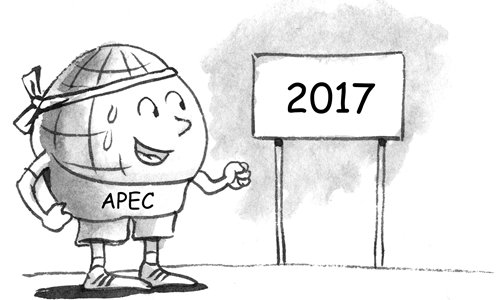
Photo: Global Times
President Xi Jinping, also general secretary of the Communist Party of China (CPC) Central Committee, will attend the 25th Asia-Pacific Economic Cooperation (APEC) Economic Leaders' Meeting held in Da Nang in Vietnam on Friday and Saturday, and visit Vietnam and Laos. This is the first overseas trip and participation in an international summit by a top leader of the CPC and the nation after the 19th CPC National Congress, hence significant at multiple levels.
The 12th National Congress of the Communist Party of Vietnam (CPV) in 2016 and the 19th CPC National Congress opened a new page in bilateral ties which have rebound after a sharp decline. The visits by senior officials, especially communication between the two parties, are a way to better relations. Since the 12th CPV National Congress, visits by senior officials of both countries have become frequent. This year, the General Secretary of CPV Central Committee, Nguyen Phu Trong, and Vietnamese President Tran Dai Quang visited China in succession.
Recently, Vietnam attended China's National Day reception and the CPV sent greetings on the success of the 19th CPC National Congress. In 2017, political reforms in Vietnam have gained momentum, economic development has been faster and the society is upbeat.
There remain old issues in ties between China and Vietnam. Yet the countries are socialist nations led by communist parties and problems can be resolved inside the family of socialism.
Trade cooperation has always been the ballast of China-Vietnam ties. A tendency for trade to develop fast has been noticed. China has been the largest trading partner of Vietnam for consecutive 13 years and Vietnam became Chinese largest trading partner in ASEAN for the first time in 2016.
Like China, Vietnam has been focusing on connectivity, with planning for high-speed rail and expressway projects. Hence the two countries have some shared interests. But at the moment, their economic ties depend mainly on import and export, without much strategic cooperation.
The impediment lies in Vietnam's public skepticism. If the CPV can build up Vietnamese people's trust in China, the two countries will make breakthrough in their cooperation. Tran's visit to China to attend the Belt and Road Forum for International Cooperation in May was seen as a step of Vietnam toward identifying with the initiative. Now, Xi's visit may push the initiative to connect with Vietnam's Two Corridors and One Economic Circle plan more effectively.
Laos is China's old friend with a shared political identity. Xi's visit will be his first to the country since the 10th National Congress of Lao People's Revolutionary Party in 2016. Lao Prime Minister Thongloun Sisoulith has deepened reforms, intensified an anti-corruption drive inside the country, and adopted diverse diplomacy to enhance the connectivity of the country and make it richer.
Laos intends to communicate and cooperate with China. Cooperation between the two is expected to be a model of the Belt and Road initiative for neighboring countries. The importance Laos has attached to Chinese projects is rarely seen in other Chinese neighbors.
APEC summit has an enduring importance as Xi visits Vietnam. Hanoi always looked at the 2006 APEC summit as one that boosted its international stature. It expects this year's APEC summit to be a defining moment for development of the country's trade and investment.
Vietnam wishes to integrate into the world economy and adjust to international trade rules to create an environment that facilitates investments and to achieve the national goal. But the Trans-Pacific Partnership that it advocated has an unclear future and the promotion of Regional Comprehensive Economic Partnership is weak. As APEC is more open, it interests Vietnam. Hanoi wishes to make APEC a primary and creative forum for economic cooperation in the region and even the world.
The 2014 APEC summit in Beijing gave shape to three development pillars and five platforms. This time APEC will promote the liberalization and facilitation of trade and investment, and promote the building of a community of shared future for mankind.
China has a big role to play in enhancing regional economic integration and exploring new mechanisms for Asia-Pacific cooperation. The world looks intently at our development and diplomacy, especially the changes in our trade policy after the 19th CPC National Congress.
The APEC summit will be an important platform to show our policy and to address the doubts. We can use the opportunity to consolidate their confidence in China's development and demonstrate China's constructive and leading role in regional and global economic cooperation.


